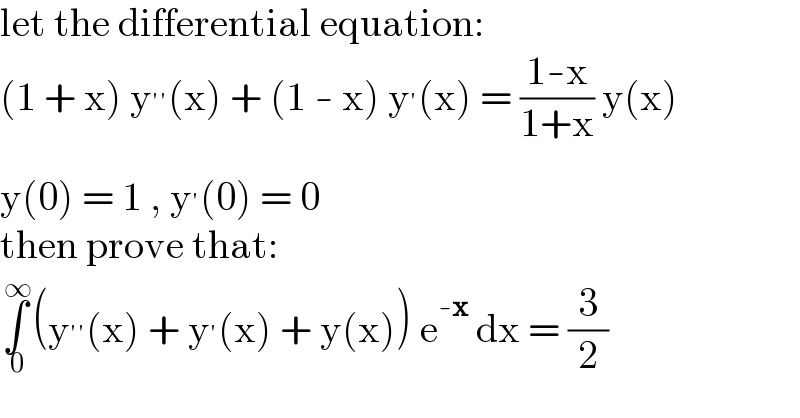
Question Number 161039 by HongKing last updated on 11/Dec/21

$$\mathrm{let}\:\mathrm{the}\:\mathrm{differential}\:\mathrm{equation}: \\ $$$$\left(\mathrm{1}\:+\:\mathrm{x}\right)\:\mathrm{y}^{''} \left(\mathrm{x}\right)\:+\:\left(\mathrm{1}\:-\:\mathrm{x}\right)\:\mathrm{y}^{'} \left(\mathrm{x}\right)\:=\:\frac{\mathrm{1}-\mathrm{x}}{\mathrm{1}+\mathrm{x}}\:\mathrm{y}\left(\mathrm{x}\right) \\ $$$$\mathrm{y}\left(\mathrm{0}\right)\:=\:\mathrm{1}\:,\:\mathrm{y}^{'} \left(\mathrm{0}\right)\:=\:\mathrm{0} \\ $$$$\mathrm{then}\:\mathrm{prove}\:\mathrm{that}: \\ $$$$\underset{\:\mathrm{0}} {\overset{\:\infty} {\int}}\left(\mathrm{y}^{''} \left(\mathrm{x}\right)\:+\:\mathrm{y}^{'} \left(\mathrm{x}\right)\:+\:\mathrm{y}\left(\mathrm{x}\right)\right)\:\mathrm{e}^{-\boldsymbol{\mathrm{x}}} \:\mathrm{dx}\:=\:\frac{\mathrm{3}}{\mathrm{2}} \\ $$
